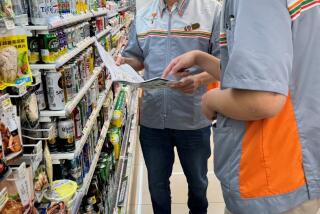American Students Aren’t Pushed to Achieve
- Share via
I wasn’t surprised to learn that American 12th-grade high school students did poorly in math and science in an international contest. From my experience helping my children study in the U.S., I thought the test results were predictable. There are big differences between American and Taiwanese education: the academic atmosphere in school, teaching styles, students’ motivation to study and parents’ expectations of their children’s education. In short, American education seems too loose and indulgent, which has resulted in poor test results.
In Taiwan, after middle school every student must take an entrance test to go into high school or a job-training program. From high school, the goal is to go to a university. To do this, a student must score well on a national university entrance exam. The competition is very intense and the pressure tremendous. In addition, all students’ test scores are announced publicly. This creates an incentive that forces them to study hard lest their scores disgrace them and their family. Thus a Taiwanese student, like a soldier having experienced hundreds of battles, has been cultivated in a spirit of competition and knows that only by studying hard will he honorably survive.
Parents have complete knowledge of what their children are doing in school. If something in the curriculum is deemed improper, the educational authorities will be censured and forced to change it. Teachers not only must complete the scheduled curricula but must care greatly about the test results. When students’ scores are announced, teaching results are revealed too. Teachers are under a lot of pressure, which pushes them to work hard.
Taiwanese school officials consider test results the most important factor in a school’s reputation. Students frequently are reminded to study hard not only for personal achievement but also to enhance the honor of the school. If you are a top student, peers and teachers will give you a great deal of applause and your family will be honored.
Where an American parent might play ball with a child who has just learned to walk, a Taiwanese parent most likely will be counting numbers with his child. Most Taiwanese parents meticulously plan their children’s education as early as possible and focus on it from the very beginning lest their children lose the educational contest at the starting point. Believing extra practice strengthens academic aptitude, Taiwanese parents are not afraid that teachers will be too strict and give too much homework. Instead, they fear their children might miss something vital.
Learning comes from a combination of society and school. One criticism of Taiwanese society and families is that they value education so much that children are stuffed like turkeys. It is true that too much input sometimes makes kids miserable and their childhood unhappy, but most Taiwanese students are grateful that their parents push them hard.
American liberal education leads to creativity and development of thought, but too much liberal education results in chaos and disorder, which is the root of inefficient study. I believe American kids might study harder with more pressure and more enticement. Since test results are alarmingly low here in Los Angeles, it’s time to consider making changes. I suggest pushing kids harder.
*
Se-jen Hwang lives in Los Angeles. She has two children and is studying finance at Los Angeles City College.
More to Read
Sign up for Essential California
The most important California stories and recommendations in your inbox every morning.
You may occasionally receive promotional content from the Los Angeles Times.













